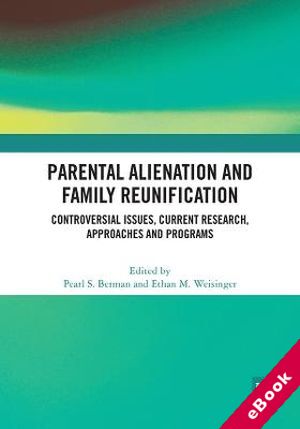
The device(s) you use to access the eBook content must be authorized with an Adobe ID before you download the product otherwise it will fail to register correctly.
For further information see https://www.wildy.com/ebook-formats
Once the order is confirmed an automated e-mail will be sent to you to allow you to download the eBook.
All eBooks are supplied firm sale and cannot be returned. If you believe there is a fault with your eBook then contact us on ebooks@wildy.com and we will help in resolving the issue. This does not affect your statutory rights.
This book on parental alienation and family reunification provides family court professionals with critical background in child development, dynamics present in violent families, and how to evaluate the testimony of experts to ensure it values children’s views, best interests of the children, and follows evidence-based practice.
As laid out in the Child Welfare Information Gateway report, 2020, Family court judges should make decisions per the best interests of the child standard. High conflict custody cases make this complicated, especially when reunification services are requested. In the middle of contentious proceedings, judges oftentimes receive conflicting information from parents. Judges and family law professionals can be lead astray, relying on unproven constructs and instruments not meeting the criteria of reliability and validity. Mandating victimized children into reunification programs that are neither evidence-based nor trauma informed can cause further harm to the children.
This book will be of interest to those working in the family courts, particularly expert witnesses, clinical psychologists, therapists, children’s services workers including social workers, child protection court workers, mental health professionals involved in child custody decisions, and researchers with an interest in parental alienation.
The chapters in this book were originally published as a special issue of 'Journal of Family Trauma, Child Custody & Child Development'.